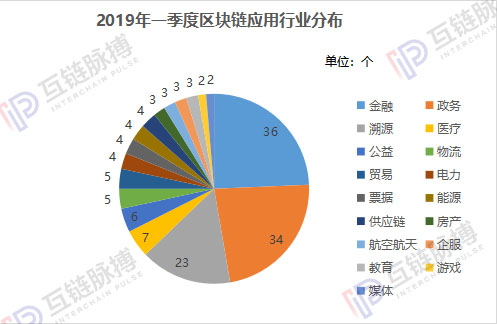Blockchain application report for the first quarter: Finance and government affairs are still the main battlefields, but they are spreading to more fields.
Since the beginning of 2019, the blockchain application has been running in small steps.
According to the incomplete statistics of the Inter-Chain Pulse Institute, in the first quarter of 2019, a total of 181 blockchain application projects were disclosed worldwide, an increase of 8.4% from the previous quarter. Among them, China's blockchain application is one of the fastest-growing countries. Of the 181 applications disclosed in the first quarter of 2019, 78 were in China, accounting for 43.1%.

(Cartography: Inter-Chain Pulse Institute)
- Completely restored Bitfinex, Tether was sued: 4 major violations, $900 million in doubt (with a 23-page lawsuit)
- Getting started with blockchain | Remarks when transferring EOS, you can still play like this
- Thailand's largest commercial bank completes blockchain B2B cross-border remittance, shortening settlement time from 1 day to 1 minute
From the perspective of the overall distribution of the industry, the two major areas of finance and government affairs are still the main battlefields for the application of blockchain.
Inter-chain pulse statistics show that in the first quarter of 2019, there were 36 blockchain financial applications, accounting for nearly 20%, and 34 government applications, accounting for 18.8%.
In financial applications, the application of blockchain technology focuses on cross-border payments, cross-border settlement, and interbank transactions. Whether it is China's four major banks, commercial banks and city commercial banks, or European and American developed banks, they are actively promoting pilot projects for cross-border and inter-bank business blockchain platforms.

(Cartography: Inter-Chain Pulse Institute)
For example, the blockchain electronic billing system developed by the Agricultural Bank of China and the Xiong'an Group has been able to support the group's implementation of the e-banking acceptance billing business in the blockchain fund management platform; Hong Kong Monetary Authority, HSBC, Russian Alpha Bank, South African Standard Bank Etc. Actively using blockchain technology to promote cross-border payments and reduce the settlement costs of foreign exchange transactions, HSBC has even reduced the settlement cost of foreign exchange transactions by a quarter through a blockchain-based system.
However, in the field of government affairs, the application direction of domestic and foreign blockchains has its own focus.
In China, government applications mainly focus on blockchain electronic invoices, commercial registration, real estate registration, judicial deposit and evidence collection. In the first quarter of 2019, the Guangdong Provincial Taxation Bureau, the Chengdu Taxation Bureau and the Shenzhen North Railway Station made rapid progress in promoting the electronic invoices for the blockchain, while the Guangzhou Municipal Administration of Industry and Commerce launched the “blockchain+commercial services” pilot. In March, the first electronic business license based on blockchain technology was issued. Ping An City’s “real estate integrated service platform”, which was built using blockchain technology, has been launched in 28 cities across the country.
Overseas, the application of blockchain in the field of government affairs mainly focuses on government election voting, combating tax evasion and money laundering. For example, the Russian ruling United Russia Party and Denver, Colorado, USA, have used blockchain technology to conduct electronic voting, counting and blockchain systems to store and track votes.

(Cartography: Inter-Chain Pulse Institute)
In addition to finance and government affairs, traceability is also the area where the largest number of applications are disclosed in the first quarter of 2019. According to statistics from the Mutual Chain Pulse Institute, in the first quarter of 2019, there were 23 blockchain traceability projects, accounting for 12.7%.
At present, the blockchain traceability application covers many fields such as food, drinks and luxury goods.
In the food and beverage sector, Carrefour, Shanxi “original vinegar”, Irish winery and Scottish wine company William Grant & Sons have begun to use blockchain technology for supply chain tracking and product traceability. In terms of luxury traceability, Tmall International, France LV, etc. have also launched a blockchain traceability system to trace the source of luxury goods.
It is worth noting that in the first quarter of 2019, in addition to the three major areas of finance, government affairs and traceability, blockchain applications are spreading to other industries.
Inter-chain pulse statistics show that in the first quarter of 2019, there were 88 applications other than finance, government affairs and traceability, accounting for 48.6%. Especially in the fields of medical care, public welfare, logistics and trade, the pace of application of blockchain is gradually accelerating.
For example, in the medical field, IBM has built blockchain technology platforms in Japan and Israel, respectively, for drug supply, medical data exchange, and counterfeit drugs; Ali Health and Alipay are based on blockchain and other technologies created by Wuhan Central Hospital. The "Future Hospital" has also been officially launched.
In terms of public welfare, IBM is using blockchain and IoT technology to monitor groundwater use in California. Ningxia Youth Social Innovation Development Center has built a network fundraising and publicity platform with blockchain technology.
From the overall situation of blockchain project disclosure in the first quarter of 2019, the two major scenarios of finance and government affairs are still the main battlefields of blockchain application, but the proportion of application projects in these two fields is gradually decreasing, with blockchain technology. In the industry outside of finance and government affairs, the popularity of the blockchain 3.0 is accelerating. Author: Mutual chain pulse Institute Wang Rong This article was [mutual] original pulse chain, please indicate the source!
We will continue to update Blocking; if you have any questions or suggestions, please contact us!
Was this article helpful?
93 out of 132 found this helpful
Related articles
- The USDT thunder has once again triggered market turmoil. Future impact geometry?
- The future of Bitcoin is the sea of stars, the lightning network is just the beginning
- Deepening the digital business strategy, Nike plans to create a cryptocurrency e-commerce platform
- Twitter to eat melon: thinking by Bitfinex 850 million
- Genesis Lending Report: A year's borrowing scale exceeds $1.5 billion, and French currency loans are favored.
- Super hard core! About PoS, what you want to know is here.
- New York State prosecutors have been paying attention to Bitfinex for a long time, and an investigation team has been set up and prosecuted






